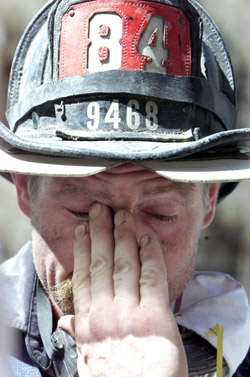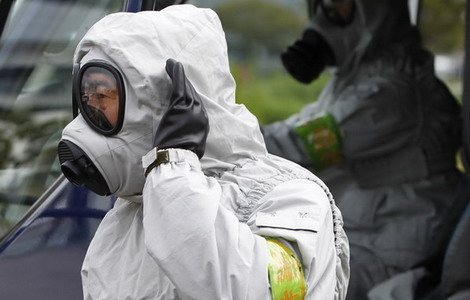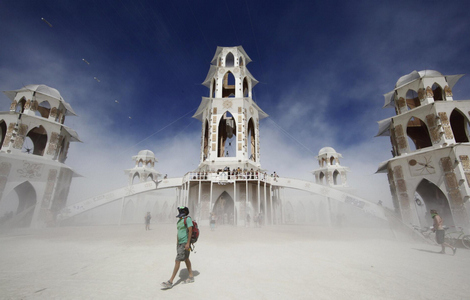9/11 firefighters have higher cancer risk
Updated: 2011-09-02 09:48
(Agencies)
|
|||||||||||
 |
|
Firefighter John Cleary wipes soot from his face while taking a break from rescue work at the World Trade Center in New York in this September 12, 2001 file photo.[Photo/Agencies] |
CHICAGO - Male firefighters who were exposed to toxic dust and smoke from the 9/11 attacks on New York's World Trade Center have a 19 percent higher risk of getting cancer of all kinds than colleagues who were not exposed, US researchers said on Thursday.
The study is the first to look at cancer rates among the all of the exposed firefighters, and the findings may help pave the way for federal health benefits for rescue workers now suffering from cancer nearly a decade after the attacks.
"This study clearly shows World Trade Center exposure in these firefighters led to an increase in cancer," said Dr. David Prezant of the Fire Department of the City of New York, whose study was published in The Lancet medical journal.
Studies so far have not found an increased risk of lung cancer, which takes many years to develop, and this study was no exception, finding no increased risk of lung cancer for exposed firefighters versus those not exposed.
Firefighters working in the rubble of the World Trade Center after two planes hit its twin towers on Sept. 11, 2001, were exposed to a several known cancer-causing agents, including polycyclic aromatic hydrocarbons, polychlorinated biphenyls and dioxins.
Prior studies have shown increased rates of post traumatic stress disorder, asthma and other respiratory illnesses among rescue workers. To date, only a handful of smaller studies have shown increased rates of cancer, which can take five to 20 years to develop.
In July, a report released by Dr. John Howard, director of the National Institute for Occupational Safety and Health, concluded that there was not yet enough evidence to support a link between the 9/11 attacks and cancer.
Without that evidence, firefighters and other rescue workers can not receive payments for cancer treatments under the James Zadroga 9/11 Health and Compensation Act, which covers illnesses like asthma and other respiratory diseases, but not cancer.
Prezant told reporters he was not sure whether his report would be enough to make the case for federal health benefits for firefighters who developed cancer after the 9/11 attacks, but said Dr. Howard, who is tasked with making the decision, is aware of his study.
Hot Topics
Libya conflict, Gaddafi, Oil spill, Palace Museum scandal, Inflation, Japan's new PM, Trapped miners, Mooncake tax, Weekly photos, Hurricane Irene
Editor's Picks

|

|

|

|

|

|







